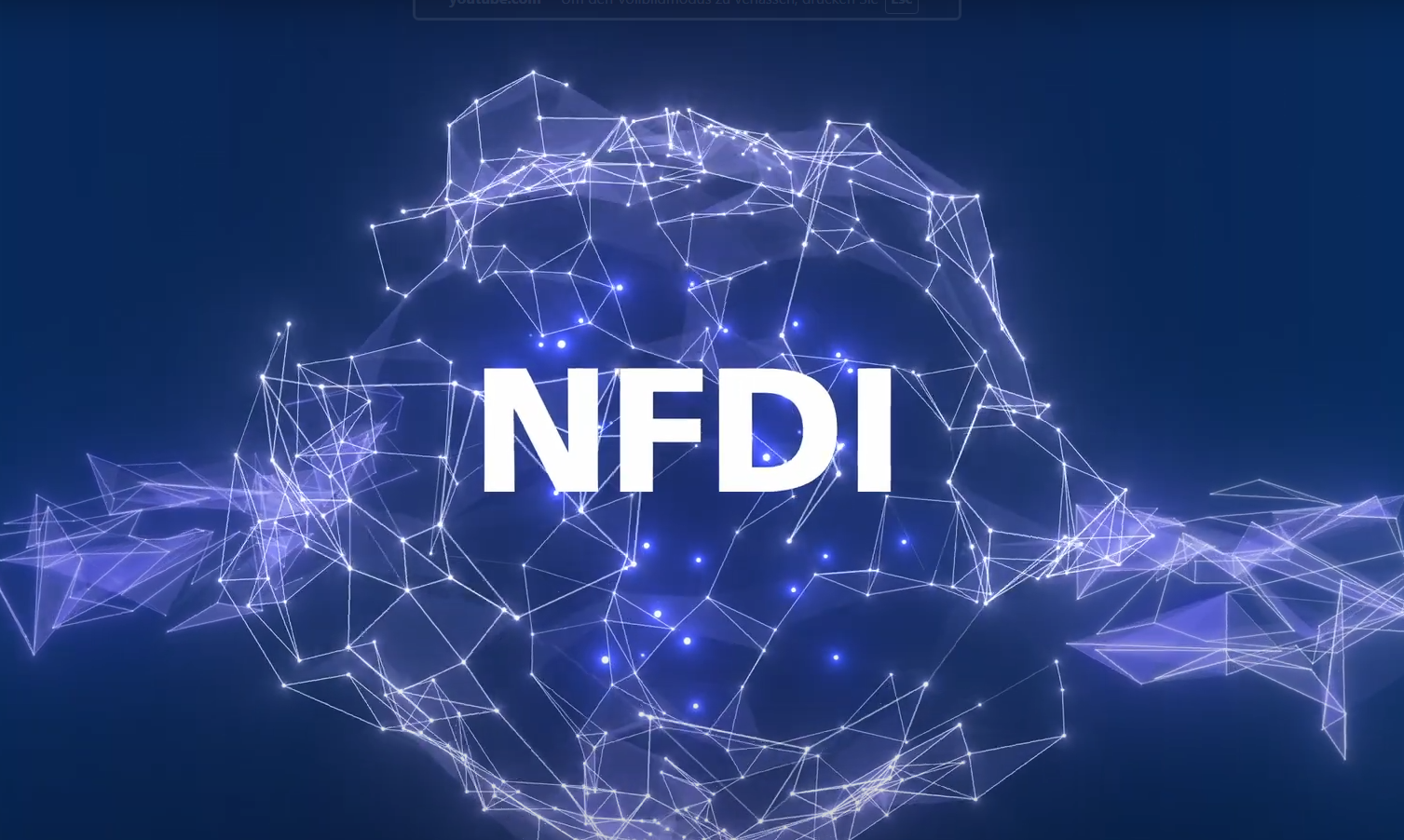National Research Data Infrastructure
The aim of the national research data infrastructure (NFDI) is to systematically manage scientific and research data, provide long-term data storage, backup and accessibility, and network the data both nationally and internationally.
The NFDI will bring multiple stakeholders together in a coordinated network of consortia tasked with providing science-driven data services to research communities.
About the NFDI
Purpose
The NFDI’s programme aims for consortia include:
- Establishment of data handling standards, procedures and guidelines in close collaboration with the community of interest
- Development of cross-disciplinary metadata standards
- Development of reliable and interoperable data management measures and services tailored to the needs of the community of interest
- Increased reusability of existing data, also beyond subject boundaries
- Improved networking and collaboration with partners outside the German academic research system with expertise in research data management
- Involvement in developing and establishing generic, cross-consortia services and standards in research data management together with other consortia
Eligibility Requirements
State-funded and state-recognised higher education institutions, non-university research institutions, departmental research institutions, academies, and publicly financed information infrastructures are eligible for funding.
To be eligible for funding, the institution or facility must either be a German legal entity or one operated by a German legal entity, both of which must comply with non-profit/public-benefit requirements.
Requirements of the project
Consortia aim to ensure the accessibility and use of research data relevant to their community of interest and their sustainability. To this end, a sound data management strategy must be developed. Existing structures and services should contribute to the NFDI and be integrated in the consortia.
Funding Criteria
Funding criteria listed in the federal-state agreement of 26 November 2018 include:
- Thematic relevance and quality of the planned measures;
- Expected added value for the development of cross-disciplinary metadata standards and the creation of reliable long-term services in the consortium;
- Establishment of the consortium in the respective scientific community and involvement of the relevant partners;
- Structural importance for the NFDI and the science system;
- Efficiency and sustainability;
- International compatibility;
- Consistent approach to data use and access as well as findability and re-usability of data based on the FAIR principles;
- Operating model which meets the needs of users and suppliers (including reasonable user fees where appropriate).
An overview of the funding criteria including notes can be found at: DFG form NFDI 12(interner Link)
Type and Extent of Funding
The German federal and state governments envisage funding up to 30 consortia. A total of up to €85 million is available per year to fund the consortia in the final development phase; this amount includes a 22 percent programme allowance for indirect project costs. The amount available to fund direct project costs thus totals approximately €70 million annually. As a rule, an individual consortium may receive between €2 million and €5 million, which includes the programme allowance for indirect project costs and €1.6 million to €3.9 million for direct project costs. On the basis of the 30 consortia grants mentioned above, an average of €2.32 million will be available for direct project costs per consortium.
Funding Duration
Consortia are initially funded for a period of five years.
Forms and Guidelines
Here you can find an overview of the Forms and Guideline(interner Link).
Consortia of the first round | |
|---|---|
| October – December 2024 | Review of proposals for further funding of the consortia |
| Early March 2025 | Meeting of the NFDI expert committee / funding recommendations of the proposals for further funding of the consortia for the German Science Council |
| Summer 2025 | Decision of the German Science Council on the further funding of consortia |
Consortia of the second round | |
|---|---|
| 30 September 2024 | Deadline for the submission of Consortia Progress Reports of the consortia |
| 11 February 2025 | Symposium on the progress reports of the consortia of the second funding round |
| March 2025 | Communication of the results of the review and evaluation of the progress reports to the consortia |
| 18 June 2025 | Deadline for submitting a binding statement on a proposal for further funding of consortia of the first funding round (with information on the composition of the consortia) |
| 6 August 2025 | Deadline for submitting the proposal for further funding of the consortia |
| October – December 2025 | Review of proposals for further funding of the consortia |
| January 2026 | Communication of the evaluation results to the consortia with the possibility to comment on them |
| March 2026 | Meeting of the NFDI expert committee / funding recommendations of the proposals for further funding of the consortia for the German Science Council |
| Summer 2026 | Decision of the German Science Council on the further funding of consortia |
| 1 October 2026 | Start of the second funding phase for consortia |
Consortia of the third round | |
|---|---|
| 28 February 2026 | Deadline for the submission of Consortia Progress Reports of the consortia of the third round |
| 7 July 2026 | Symposium on the progress reports of the consortia of the third funding round |
The process for the consortia of the third round will be largely analogous. It will take account the time delay due to the assessment of the initial proposals.
If you are unable to reach your contact person, please feel free to contact the NFDI team at
Tel. +49 228 885-3500, nfdi@dfg.d(externer Link). Please note the information contained in our FAQ(interner Link).
NFDI Expert Committee
At its meeting on 6 December 2018, the Joint Committee of the DFG established the NFDI Expert Committee, which is responsible for the process of selecting the NFDI consortia. The committee’s main duties are to evaluate proposals on the basis of a review of scientific, information technology, and structural considerations and to formulate funding recommendations for the GWK. The committee is composed of experts in various branches of science and the humanities who have extensive experience in working abroad, in research management, in scientific infrastructure facilities or in industry.
- Statemen(externer Link) by the NFDI Expert Committee on the Future of the NFDI After the Expiry of the Agreement Between the Federal Government and the Federal States in 2028
- Information for Researchers: “National Research Data Infrastructure: Key points for the second funding period published(interner Link)
- A statemen(Download) of the NFDI Expert Committee on the preparation and application of NFDI-wide basic services following the third NFDI conference
- The NFDI Expert Committee issued a second statement in 202(Download) in which it comments on the further development and expansion of the NFDI and the challenges it faces
- Observation(Download) (in German only) by the NFDI Expert Committee on planning NFDI consortia, published in follow-up to the first NFDI conference in 2019
Inquiries about the NFDI Expert Committee
Further Information
The DFG and the Joint Science Conference (GWK) are collaborating on the NFDI programme in accordance with the Agreement between the Federal Government and the Länder concerning the Establishment and Funding of a National Research Data Infrastructure of 26 November 2018. The DFG is responsible for the research-driven review and evaluation of the consortia proposals. The GWK makes decisions on the basis of funding recommendations by the DFG. To be eligible for funding within the NFDI framework, consortia must have received a positive review during the review process.
Within the NFDI framework, the consortia, the Consortia Assembly, the Scientific Senate and the Directorate will work together:
Board of Trustees
The Board of Trustees is the administrative-strategic supervisory body of the NFDI Association. Its main tasks are the appointment and supervision of the Directorate, the approval of the admission and exclusion of members as well as the approval of major financial and organisational decisions affecting the Association as such. The Board of Trustees consists of nine members, three of whom are delegated by the Federal Republic of Germany, three by the federal states and three by the Association’s Members Assembly.
Consortia
Consortia are groups of users and providers of research data that come together for the purpose of long-term cooperation. They may include state-funded and state-recognised higher education institutions, non-university research institutions, departmental research institutions, academies, and other publicly financed information infrastructures. Generally organised by research domain or method, their aim is to improve and safeguard access to and use of research data in their relevant area, thereby contributing to sustainable data management.
Consortia Assembly
Each consortium is represented by a spokesperson. The spokespersons of the consortia make up the Consortia Assembly, the central research body of the NFDI. The Consortia Assembly makes all research, operational and service-related decisions on behalf of the NFDI consortia and the NFDI and decides on the introduction of cross-disciplinary procedures, services and/or standards relating to the NFDI within the scope of the principles approved by the NFDI Scientific Senate.
Scientific Senate
The Scientific Senate is the central strategic body of the NFDI. It advises the GWK on all fundamental matters relating to the ongoing development of the national research data infrastructure and ensures that the NFDI connects smoothly with national and international developments.
Directorate
The Directorate, located in Karlsruhe, consists of a full-time director and a managing office. On 1 March 2020, Professor Dr. York Sure-Vetter was appointed full-time director of the NFDI for a five-year term. The Directorate recommends courses of action for consideration by the Consortia Assembly and the Scientific Senate, effects the necessary decisions in these bodies and serves as the external representative of the NFDI. The Directorate also coordinates the work and activities of NFDI consortia on cross-disciplinary topics. For further information please refer to the website NFD(externer Link).
Governance
A workshop on governance of the NFDI was held at the DFG Head Office in Bonn on 30 August 2019. The workshop focused on questions concerning the constitution of the consortia, the interaction of the individual structural elements in the NFDI, and specific questions concerning the submission of proposals. Here you can find the protocoll of the worksho(Download) (in German only).
Funded projects
On 26 June 2020 the Joint Science Conference (GWK) made its final funding decisions in the first round of the National Research Data Infrastructure Programme. A total of nine consortia were chosen. On 2 July 2021, the GWK approved funding for ten additional consortia as part of the second round of NFDI tenders. On 4 November 2022, the GWK decided to fund seven more consortia and an initiative for NFDI-wide basic services. In all decisions, the GWK followed the recommendations of the NFDI expert panel, which had proposed the funded applications to the GWK for funding as a result of an intensive review and evaluation process. A statistical overview of the funding decisions in the three rounds of calls for proposals can be found here:
- Information for Researchers: "Future of the National Research Data Infrastructure (NFDI) After the Expiry of the Agreement Between the Federal Government and the Federal States in 2028(interner Link), October 2024
- Report: "Pecha Café zur zweiten Förderphase der NFDI-Konsortien (im Rahmen der CoRDI 2023)(interner Link), September 2023 (in German only)
- Information for Researchers: "National Reasearch Data Infrastructure: Key points for the second funding period published(interner Link) , August 2023
- DFG Press Release: "National Research Data Infrastructure: DFG welcomes funding decisions in third selection round(interner Link) , November 2022
- GWK Press Release: "Nationale Forschungsdateninfrastruktur (NFDI) mit der Aufnahme von acht Konsortien in die Förderung komplett(externer Link) , November 2022 (in German only)
Note
Additional information about the NFDI will be published on this site during the course of the programme. For quick access please use the URL: www.dfg.de/nfdi/e(interner Link).


